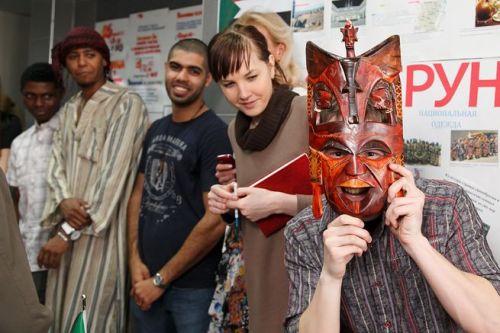Study Nuclear Engineering in Russia
Come study in Russia with Council for Foreign Education in Russia’s; official Education partner of leading Russian State Universities with Council for Foreign education in Russia (CFER) under the Learning in Russia™ program for international students!
This Department was opened in 1966. The whole existence of this Department is closely connected with history, contemporary state and perspectives of the atomic industry. Much work has been done in the area of the educational process organization.
For 40 years the academic staff of the Department has showed itself as competent teachers: in 2002, they were charged to educate students by the new educational program Safety and Non-Proliferation of Nuclear Materials. MEPHI, Moscow and TPU, Tomsk are the only Russian educational institutions which train engineers in this field. Besides these two institutions, this program is featured by the Department of Energy of the USA, such national labs as Pacific North-Eastern laboratory and Los-Alamos laboratory; Swedish nuclear Inspectorate and the International Agency of Atomic Power Engineering.
DEPARTMENT OF NUCLEAR POWER PLANTS
BACHELORS
-
Nuclear power and thermal physics
-
Nuclear Physics and Technologies
- Radiation safety and the environment
- Physics of fast processes
- Safety of Nuclear Material and Nuclear Facilities
- Applied Molecular Physics
- Thermal physics of nuclear power plants (NPP)
- Physical radiation materials science: Physical Durability materials science.
- Nuclear reactors and power plants: Information-measuring systems and equipment for nuclear power radiation experiment.
- plasma Physics
- Physics of thermonuclear fusion
- Plasma processes in devices and installations
- Plasma-surface interaction
- Physics of transport phenomena: Nuclear Methods study of the properties of matter
- Physics of transport phenomena: Nuclear instrumentation.
- Superconductivity and Physics of Nanostructures
- Physical and technical problems of metrology
- Nuclear and particle physics
- Elementary Particle Physics and Cosmology
- Electronics and automation of physical plants
- Micro and Nanoelectronic Devices and Systems for Physical Plants
-
Nuclear Power Plants and Installations
-
Nuclear reactors and materials
- Nuclear materials: accounting, control and safe handling
- Design and manufacture of fuel elements and assembling Nuclear Power plant
-
Isotope separation technology and nuclear fuel
- Nuclear fuel (advanced functional materials)
- Molecular-selective phenomena and nano-structured materials

MASTERS
-
Computer-Aided Design of Thermal and Nuclear Power Stations
-
Nuclear Physics and Technologies
- Radiation safety of people and the environment
- Automation systems, physical systems and their components
- Physics of run-away processes
- Technical aspects of the nuclear non-proliferation
- Physics of nuclear power plants
- Thermal physics of nuclear power plants
- Information-measuring system of nuclear power plants and technology of radiation experiment
- Micro-and nanoelectronic devices and systems for physical installations
- Methods and apparatus for Applied Nuclear Physics
- The nuclear-physical methods of investigation of the properties of matter
- Durability Physical Materials
- Computer health systems
- Nuclear physics and astrophysics
- Physics of Extreme States of substances
- Experimental study and modeling of fundamental interactions of elementary particles and atomic nuclei
- Physics of charged particle beams and electrical installations
- Medical particle accelerators
- Plasma-surface interaction
- Plasma processes in devices and installations
- Plasma Physics
- Physics of thermonuclear fusion
- Nuclear Methods
- Solar-Terrestrial Physics
- Applied Physics and Ion Mass Spectroscopy
- Isotope separation of physics and molecular mixtures
- Electronics physical facilities
- Laser Physics
- Particle Physics and Cosmology
- Heterostructure physics and nanotechnology electronics
- Solid State Physics and Photonics
- Superconductivity and Physics of Nanostructures
- Applied Superconductivity
- Electronics physical facilities
- Physical and technical problems of metrology
- Medical Physics
- Nuclear Electric Power Plant Control
- Physics of Kinetic Phenomena
- Nuclear and Technical Inspection and Control
- Nuclear and particle physics
- Elementary Particle Physics and Cosmology
- Electronics and automation of physical plants
- Micro and Nanoelectronic Devices and Systems for Physical Plants
-
Nuclear power and thermal physics
- Safe handling of nuclear materials
DEPARTMENT OF ELECTRONICS AND AUTOMATION OF NUCLEAR PLANTS
SPECIALIST
- Electronics and Automation of Nuclear Plants
DOCTORATE
- Automation and Control of Engineering Processes
- Engineering and Production Automation and Control (nuclear industry)
- Design, Operation and Decommissioning of Nuclear Power Plants
- Thermal Physics and Basics of Thermology
- Plasma Physics
- Instruments and Methods of Experimental Physics
































